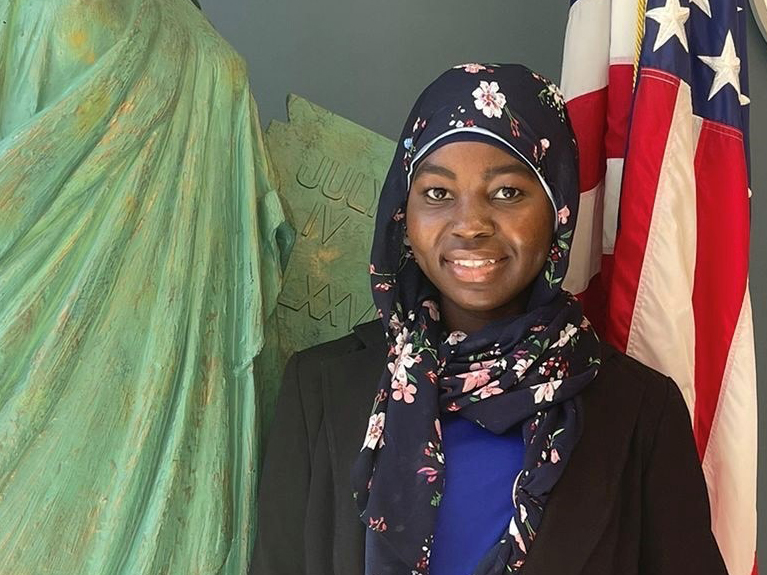Education is a prized commodity for Makka Djibrine Khatir. But it hasn’t always been this way. Indeed, for most of her early life, education was the same as suffering.
Khatir was born in 2003 in the Gaga refugee camp in Chad, the daughter of parents who fled the genocide in Darfur. Her parents escaped their village, embarking on an arduous journey to Chad. Her mother, pregnant with Khatir and her twin sister, rode a donkey while her grandmother walked beside them. The family lived at Gaga for the next 12 years, working as farmers and raising eight children.
Khatir attended a school in the camp. She remembers that the teachers often handed out harsh discipline. When Khatir was around ten years old, her younger brother fell ill, and she was tasked with taking him to the hospital. At school, she asked her teacher if she could take her brother to a doctor. Her teacher told her to go to class instead, threatening to punish her if she didn’t. When she explained that her brother was so sick that he couldn’t move, the teacher retorted, “I don’t care.”
So, Khatir took matters into her own hands. She went to class as instructed and immediately asked if she could use the bathroom. The teacher let her go, and she ran away from school as fast as she could, her feet pounding on the dusty ground. She took her brother to the hospital, where he received the treatment that he desperately needed.
The next day, Khatir was called to the principal’s office. The principal declared that she would be punished for disobeying her teacher. He called four of her classmates into the room. They held her down while the principal beat her with a whip. She remembers that he “beat me so hard that my back was bleeding.”
After school that day, Khatir went home crying. Her face wet with tears, she told her father that she wouldn’t go back to school if she kept getting beaten. He replied that if she didn’t return, she would be punished again at home. Torn between two horrible situations, she reluctantly decided to go back to school.
In September 2015, Khatir, her mother, and her siblings were accepted as refugees to the U.S. and settled in Buffalo, New York. Khatir entered seventh grade at Newcomer Academy, a middle school for recent immigrants, without knowing a word of English. During her first day, afraid of being abused as she had been at her former school, she didn’t interact with her teachers. She hid from them, dreading their retribution. Yet, her teachers didn’t hurt her. Instead, they embraced her. She recalls, “My teachers were so friendly. They tried to hug me, they tried to get to know me.”
The warmth that Khatir encountered in that school setting changed her life. She earned straight A’s throughout middle and high school, graduating as the Salutatorian of her high school class. She also created an art project about her childhood in Chad. It featured sprawling tents, aid workers, and a road leading toward her future.
Khatir’s art reveals how her identities as a student and refugee are intertwined. She says, “Chad defines who I am. Because of Chad, [I am] the person who I am today, [always] disciplining myself, working so hard, trying to catch up to things [in America] that I never had the chance to do in Chad. In Chad, they didn’t provide us with the essential skills that we need in life, such as education. The discipline that I had during my childhood motivates me to fight. It makes me the best person I can be.”
Today, Khatir is a straight-A student at Buffalo State University, majoring in International Relations. Reflecting on her life and accomplishments, she says, “Life is a competition, but it is a competition between you yesterday versus you today. I always say tawakklatu ala-allah, which means in English, ‘I have trust in God.’ Just because things are hard doesn’t mean they are impossible. So, the only thing to do is [to] get the work done [and] try to learn as much as you can.”

